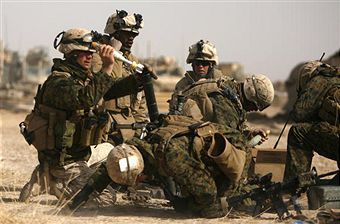 Fighting is now well under way in southern Afghanistan, as NATO forces are executing Operation Moshtarak. The plan is aimed at shoring up security around Kandahar city and recapturing the remaining Taliban strongholds in Chah-e-Anjir, Western Babaji, Trek Narwa and Marjah in Helmand province, though the latter is getting all the publicity.
Fighting is now well under way in southern Afghanistan, as NATO forces are executing Operation Moshtarak. The plan is aimed at shoring up security around Kandahar city and recapturing the remaining Taliban strongholds in Chah-e-Anjir, Western Babaji, Trek Narwa and Marjah in Helmand province, though the latter is getting all the publicity.
The operation has been billed as “NATO’s biggest” and a “test” of the new counter-insurgency policy, designed to first eradicate militants and, then, follow up re-establish government control and civil services. These claims may have been exaggerated for effect. Operation Medusa in 2006 was a big battle (and one that NATO almost lost), while the forward deployment of US troops in southern Helmand when ISAF commander General McCrystal originally arrived in theatre was then billed as NATO’s “first test”. But, given the bad news coming out of Kabul in the last few months, a success in Kandahar and Helmand will be key to the international effort. In that sense, they are a test of Obama’s new strategy.
Unlike the military’s operations before last year’s presidential elections – which, as a senior Cabinet minister told me, had not been explained well enough to the British public – this operation has come after days of PR bombardment. But signaling the operation in advance has also had the aim of minimizing civilian causalities, by warning the local population of an imminent attack, and allowing a greater level of local involvement and ownership of the mission. Since the operation began, officials have held three traditional gatherings, or shuras, in different villages in Marjah.
So far, British forces have managed to advance without causing civilian casualties. Just one Apache Helicopter Hellfire missile had been fired in the UK area of operations. But in the US sector, 10-12 civilians have reportedly been killed by a missile strike. How this is handled will, in many ways, determine how the mission is seen both in Kabul and abroad. Both US and British forces have, however, taken casualties. NATO has reported the deaths of seven international troops. Four of the dead soldiers are from the US, two are from Britain, and the latest has yet to be identified.
Operation Moshtarak will not determine the course of the Afghan war. Counter-insurgency, unlike traditional warfare, is not about set piece battles. But it is about bringing the population onside. In which case, the key to this will not be the operation’s publicised first phases, but rather the month-long period that comes afterwards, when NATO and local forces bed down – as well as afterwards, when they begin to leave and the Taliban try to come back.






Comments